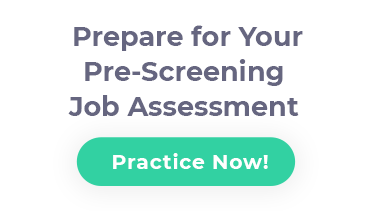World Food Programme (WFP) Hiring Process, iMocha Aptitude Tests & Interviews Online Preparation [2025]

Introduction to the World Food Programme (WFP)
The World Food Programme (WFP), also known as Programme alimentaire mondial (PAM) in French, is the world’s largest humanitarian organization dedicated to combating global hunger. Every year, WFP delivers food assistance to millions of people in need, including those affected by conflict, disasters, and economic hardships. The organization works across various regions and environments, often in challenging situations, to ensure that food security is achieved for all.
As WFP operates in dynamic and often high-pressure settings, the organization places great emphasis on recruiting individuals who are not only skilled in their fields but also committed to humanitarian values. A role at WFP goes beyond technical capabilities; it demands resilience, adaptability, and a strong alignment with WFP’s mission. Therefore, candidates face a competitive and rigorous selection process designed to assess their ability to contribute effectively to WFP’s life-saving operations.
What Is the Recruitment Process at WFP?
WFP’s hiring process is structured to find people who share the organization’s dedication to ending hunger and supporting global stability. Given the nature of WFP’s work, the process is comprehensive, giving you multiple opportunities to demonstrate your skills, experience, and alignment with WFP’s mission.
You can expect to go through several stages, starting with an online application, followed by assessments like the iMocha aptitude test, and one or more interview rounds. Each phase gives WFP a chance to get to know you and see how well you fit into the organization’s core values and mission. This structured approach allows WFP to select candidates who can thrive in a role focused on humanitarian impact.
Application Stage: Making a Strong First Impression
Your journey with WFP begins with an online application. This is where you present your qualifications and motivations for joining the organization. To make a strong first impression, ensure that your resume and cover letter are tailored to highlight experiences relevant to WFP’s mission. This could include work in emergency response, logistics, project management, or any role that showcases adaptability and resilience.
If you have international experience, language skills, or cross-cultural competencies, be sure to emphasize these qualities—they’re highly valued at WFP. Carefully review the job description and match your skills and achievements to the requirements listed. A strong, well-targeted application is essential to advancing through WFP’s competitive hiring process.
WFP’s Screening and iMocha Aptitude Test
Once your application is submitted, you may be invited to complete the iMocha aptitude test, which is a key part of WFP’s hiring process. This test assesses essential skills like logical reasoning, verbal reasoning, and numerical ability. Here’s what each test topic covers in more detail:
- Logical Reasoning: This section measures your ability to analyze patterns, sequences, and relationships in abstract data, reflecting how you can approach and solve unfamiliar problems. Logical reasoning tasks may involve recognizing patterns in sequences of shapes or identifying relationships between different figures. This skill is crucial in roles requiring quick, strategic thinking and the ability to make informed decisions without relying on predefined rules.
- Verbal Reasoning: Verbal reasoning assesses your ability to comprehend, interpret, and analyze written information. You’ll encounter passages or statements followed by questions that ask you to evaluate conclusions, make inferences, or determine the core message. This area of the test is especially relevant for roles that require clear communication, as it reflects your ability to quickly process and respond to complex information.
- Numerical Ability: Numerical ability focuses on your mathematical skills and ability to interpret numerical data accurately. Questions may include calculations with percentages, ratios, or interpreting data presented in tables or graphs. This section helps WFP gauge your quantitative skills, essential for roles that involve budgeting, data analysis, or logistical planning, where precise calculations are needed to ensure effective decision-making.
- Situational Judgment Test: Some iMocha aptitude tests include situational judgment scenarios, where you’ll be asked to choose the most appropriate response to hypothetical workplace situations. These scenarios reflect typical challenges in WFP’s operational environment, such as handling conflicts, making quick decisions, or prioritizing tasks under pressure, and offer insight into how you would fit within WFP’s culture and values.
WFP’s Additional Assessments
Depending on the position you’re applying for, you may be required to complete additional assessments beyond the iMocha aptitude test. These can include personality tests, language proficiency assessments, or technical skills tests related to your specific role. Each assessment is designed to evaluate a different aspect of your capabilities, helping WFP determine if you’re the right fit for the demands of the position.
For example, personality tests help WFP understand your work style and how well you might integrate into their team. Technical skills tests, on the other hand, assess your specific expertise, ensuring you have the practical knowledge required for the job. Be prepared to approach each assessment with focus and honesty, as these evaluations allow WFP to understand you more comprehensively as a candidate.
WFP’s Interview Process
If you successfully pass the assessments, you’ll move on to the interview stage. WFP’s interview process often includes multiple rounds and may involve both behavioral and situational questions to gauge your experience, adaptability, and commitment to humanitarian work. These interviews are designed to assess not only your skills but also your alignment with WFP’s core values and mission.
During the interview, you can expect questions that challenge you to demonstrate how you would respond to scenarios typical of WFP’s work. For example, you might be asked how you would handle a challenging logistical situation or resolve a conflict in a high-stress environment. To prepare, reflect on your past experiences, particularly those that show resilience, problem-solving, and collaboration. Think about times when you’ve successfully navigated complex situations, as these examples will help WFP see how you could contribute effectively to their team.
Final Selection and Offer
If you successfully pass the interview stage, you’ll move into the final selection phase. At this stage, WFP may conduct reference checks and other final evaluations to confirm your suitability for the role. This step ensures that all selected candidates meet not only the technical requirements of the job but also align with WFP’s mission and core values.
Once the final evaluations are complete, WFP will extend an offer to successful candidates. The offer process typically includes details about your role, responsibilities, and the terms of employment. If you receive an offer, expect additional onboarding steps to help you transition smoothly into your new position at WFP. This is a great time to review WFP’s projects and goals, so you can begin your journey with a clear understanding of how your role will support the organization’s mission.
How to Prepare for WFP’s Hiring Process?
Navigating WFP’s hiring process requires preparation and a clear understanding of the organization’s mission. It is essential to research WFP’s initiatives, goals, and recent projects, as this knowledge will help you align your application and interview responses with WFP’s mission to end hunger worldwide. Preparing for each assessment is equally important. Practice sample questions for the iMocha aptitude test and other assessments you may encounter; understanding the types of questions and refining your problem-solving skills will give you an edge. Throughout the process, be sure to showcase experiences and skills that are directly relevant to the job, such as resilience, teamwork, and adaptability—qualities that are essential for anyone working in a challenging humanitarian environment. Additionally, practice clear and concise communication, especially during interviews, where demonstrating empathy and clarity will reflect well on your candidacy. Communication skills are vital at WFP, given the cross-cultural and collaborative nature of the work.

